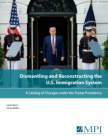Border Enforcement
Recent Activity
During this Leadership Visions address, Homeland Security Assistant Secretary John Morton offered his perspectives on U.S. Immigration and Customs Enforcement, its mission, and its future.
Pages
Recent Activity
Los llamados de los activistas a "desbancar a la policía", a raíz de una serie de encuentros mortales para los miembros de la comunidad negra, hacen eco de las demandas anteriores de "abolir el ICE" y reflejar una crítica más amplia de los sistemas de aplicación percibidos como demasiado agresivo.
El acuerdo de cooperación migratoria firmado por los gobiernos de México y Estados Unidos en junio de 2019 marcó el comienzo de un intenso período de cambio en las políticas mexicanas, con efectos en su frontera compartida. Un año después, el informe examina cambios en los sistemas de control migratorio y protección humanitaria de México. También explora cómo la pandemia del COVID-19 ha afectado la frontera y destaca oportunidades para el desarrollo de políticas en el futuro.















When Emergency Measures Become the Norm: Post-Coronavirus Prospects for the Schengen Zone